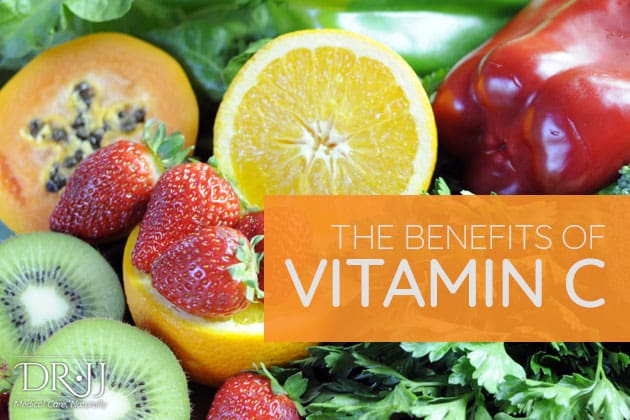
Vitamin C is one of the many different types of vitamins that I deal with in my naturopathic practice.
Vitamins are nutrients that your body needs to function.
Since vitamin C is water soluble, your body doesn’t store it.
We instead can get vitamin C from the foods we eat on a daily basis.
These foods include the many fruits and vegetables within your diet.
We can also intake vitamin C from supplements, or intravenous infusion.
Vitamin C has been the go-to for moms for decades, but does it actually help?
I frequently use vitamin C treatments for viral immunity, but it’s good for so many other reasons.
If you prefer video to reading, you can watch the video where I discuss what you need to know about the benefits of Vitamin C.
Let’s talk about vitamin C, its benefits and the many conditions that can result from a vitamin C deficiency.
Why Is Vitamin C Important?
Vitamin C is important for the formation of blood vessels, cartilage, and collagen.
It’s also useful as a preventative medicine.
It’s an antioxidant that breaks down molecules produced when you eat or are exposed to smoke and sources of radiation.
This in turn may reduce your risk of heart disease, cancer, and other diseases.
It also produces collagen, which aids in your skin, bone, and muscle health.
In addition, keeping your vitamin C levels up through either your diet or supplementation may help:
- Reduce your risk of getting scurvy
- Prevent certain types of cancer, including colorectal cancer
- Reduce the risk of cold and flu by boosting your immune system
- Reduce your risk of age-related macular degeneration
- Reduce your risk of heart diseases
- Lower your stress levels, naturally
- Address non-alcoholic fatty liver disease
- Address herpes simplex virus
- Protect your thyroid against oxidative stress
- Act as a natural hangover solution
How To Get Vitamin C
Vitamin C can be obtained through the food you eat or through supplementation.
If you supplement, you’ll have the option of capsules, tablets, liquid form, or even IV for the more serious deficiencies.
Including fruits and vegetables that contain vitamin C into your diet may require some work around if you don’t really like vegetables or fruits.
In this case, you could:
- Include leafy greens, fruits, and vegetables together in a salad
- Add your favorite dip with the fruits and vegetables, like hummus or guacamole
- Place the leafy green, fruits and vegetables in rice, a wrap, or something else you enjoy
- Make and drink smoothies, fruit or vegetable juice
- Throw a handful of fruits and vegetables in a bag to have as a snack
The Link Between Vitamin C And Calcium
Both vitamin C and calcium are nutrients help to support good bone health.
Some people also take what is referred to as “buffered vitamin C.”
This combines vitamin C with other buffering minerals such a calcium and magnesium.
It’s possible to have sensitivity because it is an acid, even though a mild one.
That’s the reason you’ll find vitamin C and calcium together in some tablets, or alternately, some people take milk with their supplement.
What Is Ester-C?
Ester-C is a different form of ascorbic acid that is possibly a more absorbable version.
It’s not enough so that I find there are benefits enough over regular vitamin C, though.
Vitamin C And Cataracts
Vitamin C plays a critical role in keeping oxygen levels low in your eyes.
A balanced level of vitamin C in the body helps to reduce the risk of oxidative stress in the eyes and cataracts.
In fact, there was a study that quantified how helpful vitamin C was for this disease.
Researchers determined that it could delay the onset of cataracts by about 10 years.
How Much Vitamin C Should You Take?
Your recommended daily intake of vitamin C can vary based on your gender, whether you are pregnant or not, and other factors.
The average dose that I recommend is 1000mg daily, though you can take much more than that if needed.
Just like the old wives’ tale, if you feel illness or a cold coming on, bump up your dosage, as it will help stimulate your immune system.
It can help it shut down the virus before the symptoms take root.
Too much vitamin C though can cause uncomfortable symptoms.

What Happens If You Take Too Much Vitamin C?
If you take exceptionally high doses of vitamin C, you may get digestive issues, such as diarrhea.
Other possible symptoms are:
- Nausea
- Vomiting
- Heartburn
- Stomach cramps
- Headaches
The good news is that if you do overdo it, it’s unlikely to harm you, other than maybe having some or all of the above symptoms for a couple of days at most.
Some people mega dose as a treatment for cancer or arthritis, but if you go over 1,000mg/day, you should check with your naturopath first.
One possible side effect that persistent high doses have been linked to is an increase in kidney stone formation.
More research is needed however, and it doesn’t seem to be a common complaint.
Vitamin C For Adrenal Fatigue
One reason I frequently prescribe vitamin C is for adrenal fatigue.
This can happen when your adrenal glands are overworked due to prolonged stress.
Adrenal glands are activated by a stressed state, and when they can’t keep up anymore, it can lead to a low cortisol state.
This is what we try to avoid with ascorbic acid supplements.
What Happens When You’re Vitamin C Deficient?
A deficiency for vitamin C is more common in:
- Smokers or those exposed to second hand smoke frequently
- Those with gastrointestinal disorders or cancer
- Those who have diets with a low amount of fruits and vegetables
In this case, if you fit into the above categories, you may want to consult with a naturopathic doctor to see how you could increase your vitamin C in your diet.
If you are low in vitamin C, it can increase your risk of:
- Anemia
- Poor wound healing
- Heart disease
- Arthritis
- And more
Scurvy due to vitamin C deficiency also happens to modern day people, not just pirates.
This disease causes gingivitis, gum problems, bleeding and loose teeth.
You’ll also have a much weaker immune system, and be more susceptible to free radical damage.
Dietary Sources Of Vitamin C?
If you’re able to eat enough of the following foods, you should be able to get the recommended daily dose through your diet.
Remember that fresh is better, as once heated up, vitamin C starts to break down and lose its efficacy.
Some common sources of dietary vitamin C include:
- Vegetables such as bell peppers, broccoli, cabbage and Brussels sprouts, broccoli, tomatoes and potatoes
- Superfoods like berries and leafy greens
- Fruits coming from the citrus family, of course
- Fruits such as mango, blackcurrants, apples, lychees, kiwis, strawberries, pineapples and papayas
- Herbs such as parsley, thyme and rosehips
Questions? Ask Dr. JJ
Have you been finding you’ve been sick more often than in the past, or does your family have a history of cataracts or arthritis?
Are you concerned about the amount of vitamin C you’re getting in your diet?
As a naturopathic doctor, I can help.
Call now to book a consultation with me, Dr. JJ, and let’s determine your best dose for success.
Book your appointment with me, Dr. JJ, today.
If you have questions about naturopathic medicine, or you’d like to take your first step into the world of naturopathy, contact me, Dr. JJ, and let’s book an appointment.
Yours in health,
Dr. JJ Dugoua, Naturopathic Doctor
600 Sherbourne St, Suite 315,
Toronto, ON M4X 1W4
-https://goo.gl/maps/6VDXwiCihRpDRo5A9
Dr. JJ Dugoua is a naturopathic doctor in Toronto and has a PhD in Pharmaceutical Sciences. His clinic provides solutions for many health concerns and has a special focus on thyroid health issues.


